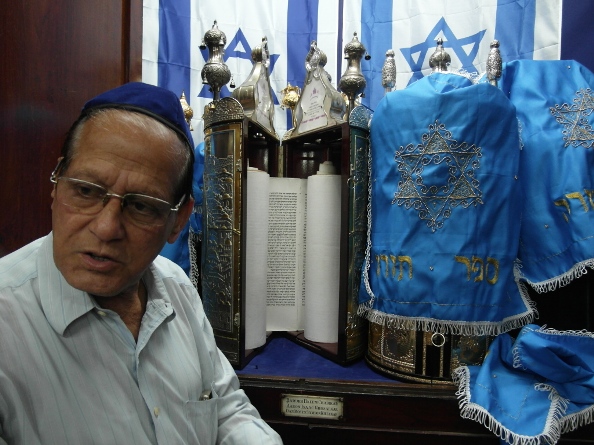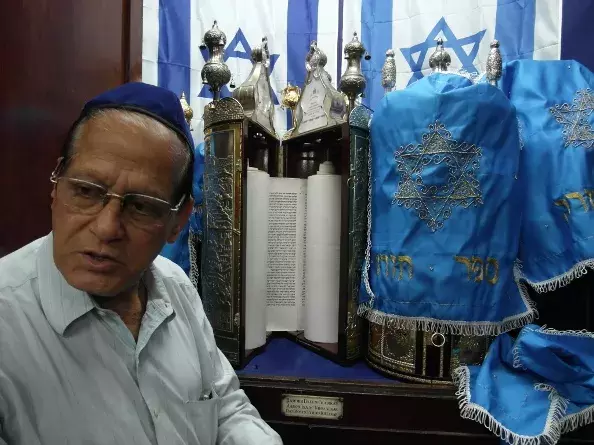Error message
Please join us at the Gala Opening of the new Arts Exhibition --
Lost and Found: Jewish Communities of India
June 10 - September 9, 2018

This event is free and open to the public. It includes a reception and guided tour by exhibition consultant, Kenneth X. Robbins
The exhibition runs from June 10 - September 9, 2018.
Curator: Michael Schuster
Consultant and Scholar: Kenneth X. Robbins
Photographer: Gayle Goodman
Installation Design: Lynne Najita
Coordinator: Eric Chang
India has long been a diverse region made up of different peoples, customs, religions, languages, and ethnicities. The majority of people are Hindu, with large Muslim, Christian, Jain, Sikh, and indigenous tribal communities. There are also three small historic Jewish communities. Two of the communities trace their domicile in South Asia to over two millennia. There is physical and written evidence of the Jewish presence in India for at least a thousand years.
This exhibition, focuses on the following historic groups: the Cochini Jews (also known as the Kerala or Malabari Jews), the Benei Israel Jews, and the Baghdadi Jews. There are no instances of indigenous anti-semitism in India. Although the majority of Indian Jews have migrated to Israel, there is still a presence in India. Through photographs, paintings, video, ritual objects, and historical artifacts, the viewer will learn about the customs, rituals, and synagogues of these unique communities. The exhibition will explore the contributions of Jews to Indian society and the impact of Indian culture on Jewish life there.
This exhibition is entitled “Lost and Found” because over centuries of time there has been a continuous if often disrupted communication with the larger Jewish population centers in the Middle East and Europe. Some of the Indian communities describe their ancestors as having been lost at sea or even lost tribes of Israel. Since Indian independence in 1947, the majority of Indian Jews have “returned” to Israel.
Please join us at the Gala Opening of the new Arts Exhibition --
Lost and Found: Jewish Communities of India
June 10 - September 9, 2018

This event is free and open to the public. It includes a reception and guided tour by exhibition consultant, Kenneth X. Robbins
The exhibition runs from June 10 - September 9, 2018.
Curator: Michael Schuster
Consultant and Scholar: Kenneth X. Robbins
Photographer: Gayle Goodman
Installation Design: Lynne Najita
Coordinator: Eric Chang
India has long been a diverse region made up of different peoples, customs, religions, languages, and ethnicities. The majority of people are Hindu, with large Muslim, Christian, Jain, Sikh, and indigenous tribal communities. There are also three small historic Jewish communities. Two of the communities trace their domicile in South Asia to over two millennia. There is physical and written evidence of the Jewish presence in India for at least a thousand years.
This exhibition, focuses on the following historic groups: the Cochini Jews (also known as the Kerala or Malabari Jews), the Benei Israel Jews, and the Baghdadi Jews. There are no instances of indigenous anti-semitism in India. Although the majority of Indian Jews have migrated to Israel, there is still a presence in India. Through photographs, paintings, video, ritual objects, and historical artifacts, the viewer will learn about the customs, rituals, and synagogues of these unique communities. The exhibition will explore the contributions of Jews to Indian society and the impact of Indian culture on Jewish life there.
This exhibition is entitled “Lost and Found” because over centuries of time there has been a continuous if often disrupted communication with the larger Jewish population centers in the Middle East and Europe. Some of the Indian communities describe their ancestors as having been lost at sea or even lost tribes of Israel. Since Indian independence in 1947, the majority of Indian Jews have “returned” to Israel.







